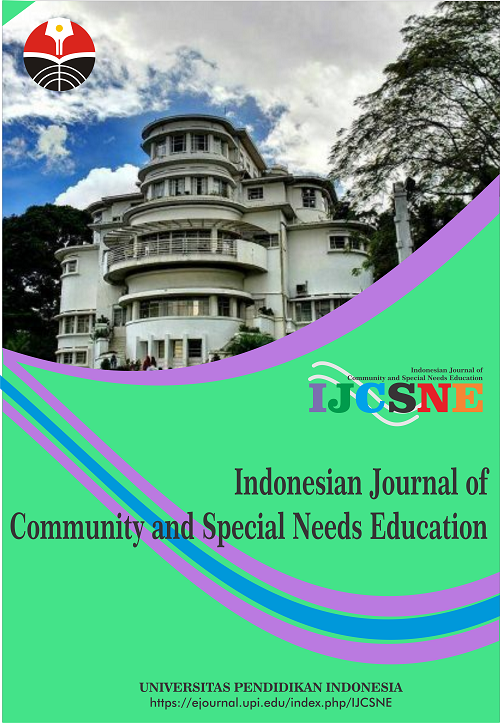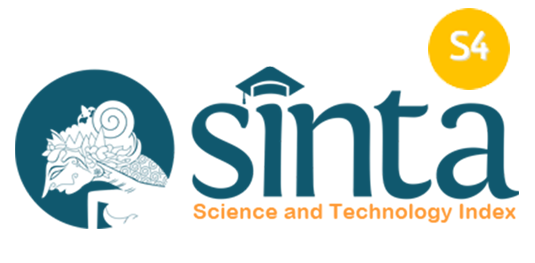Emotional Intelligence as A Predictor of Academic Stress Management among Undergraduate Students
Abstract
Keywords
Full Text:
PDFReferences
Agrawal, R. K., and Chahar, S. S. (2007). Examining role stress among technical students in India. Social Psychology of Education 10(1), 77-91.
Alagarsami, S. (2022). Managing academic stress. Monthly Multidisciplinary Research Journal 3(9), 45-54.
Alsulami, S., Al-Omar, Z. and Alhabeeb, M. (2020). Perception of academic stress among health science preparatory program students in two Saudi universities. Advances in Medical Education and Practice 9, 159–164.
Clarke, N. (2010). Emotional intelligence and its relationship to transformational leadership and key project manager competences. Project Management Journal, 41(2), 5-20.
Cui, G., Yin, Y., Li, S., Chen, L., Liu, X., Tang, K., and Li, Y. (2021). Longitudinal relationships among problematic mobile phone use, bedtime procrastination, sleep quality and depressive symptoms in Chinese college students: A cross-lagged panel analysis. Boston Medical Center Psychiatry, 21(1), 1-12.
Deb, S., Strod, E and Sun, J. (2015). Academic stress, parental pressure, anxiety and mental health among Indian high school students. International Journal of Psychology and Behavioral Sciences 5(1), 26-34.
Hasan, H., Wahid, S. N. S., Mohamad, M., and Aminuddin, A. S. (2022). The mental wellness differences between social science and technology science students of uitm during odl sessions. Journal of Islamic, 7(46), 1-9.
Lavalekar, A., Kulkarni, P., and Jagtap, P. (2010). Emotional intelligence and marital satisfaction. Journal of Psychological Researches, 5(2), 185-194.
Mayer, J. D., and Salovey, P. (1995). Emotional intelligence and the construction and regulation of feelings. Applied and Preventive Psychology, 4(3), 197-208.
Morgal, F., Yashein, S., and Alvis, T.W. (2016). Relationship of emotional intelligence and stress in undergraduate medical students. Journal Psychol Clin Psychiatry, 5(3), 1-5.
Pascoe, M. C., Hetrick, S. E., and Parker, A. G. (2020). The impact of stress on students in secondary school and higher education. International Journal of Adolescence and Youth, 25(1), 104-112.
Reddy, K. J., Menon, K. R. and Thattil, A. (2022). Academic stress and its sources among university students. Biomedical and Pharmacology Journal, 11(1), 32-40.
Rehana, R. (2018). Relationship between emotional intelligence and academic stress of university students. Journal of Research in Social Sciences, 6(2), 2305- 6533.
Srivastava, K., Joshi, S. and Basannar, D. (2011). Emotional intelligence scale for medical students. Industrial Psychiatry Journal, 20(1), 39–44
Steven, C., Schneider, E., Bederman-Miller, P. and Arcangelo, K. (2019). Exploring the relationship between emotional intelligence and academic stress among students at a small, private college. Contemporary Issues in Education Research – Fourth Quarter 12(4), 93-101.
Wasserman, T., and Wasserman, L. D. (2012). The sensitivity and specificity of neuropsychological tests in the diagnosis of attention deficit hyperactivity disorder. Applied Neuropsychology: Child, 1(2), 90-99.
Wilks, S. E. (2015). Resilience amid academic stress: The moderating impact of social supports among social work students. Advances in Social Work, 9(2), 106-125.
Yousif, M. A., Arbab, A. H. and Yousef, B. A. (2022). Perceived academic stress, causes and coping strategies among undergraduate pharmacy students during Covid'19 pandemic. Journal of Advances in Medical Education and Practice, 13, 183-197.
Zarch, Z. N., Marashi, S. M. and Raji, H. (2014). The relationship between emotional intelligence and marital satisfaction: 10-year outcome of partners from three different economic levels. Iranian Journal of Psychiatry, 9(4), 188-196.
Zhang, X., Gao, F., Kang, Z., Zhou, H., Zhang, J., Li, J., Yan, J., Wang, J. Liu, H., Wu, Q. and Liu, B. (2022). Perceived academic stress and depression: The mediation role of mobile phone addiction and sleep quality. Frontiers in Public Health, 10, 1-12.
DOI: https://doi.org/10.17509/ijcsne.v3i2.57912
Refbacks
- There are currently no refbacks.
Copyright (c) 2023 Universitas Pendidikan Indonesia

This work is licensed under a Creative Commons Attribution-ShareAlike 4.0 International License.















